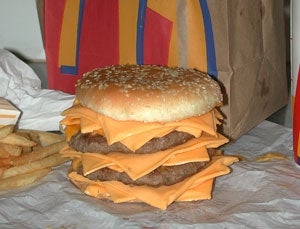OAK PARK, IL—Fearful of the prospect of class-action lawsuits, seven of the nation’s largest fast-food chains voluntarily agreed Monday to place cheese limits on their own sandwich items.

“With Americans becoming increasingly health-conscious and litigious, the restaurant industry felt it necessary to protect itself with a self-imposed cheese cap,” said Paul Conklin, president of the National Association of Fast-Food Retailers. “Gone are the days when we could load a burger with seven slices of fatty, cholesterol-laden American cheese without fear of reprisal.”
Effective Oct. 1, McDonald’s, Burger King, and five other leading chains will institute the “three-ounce rule,” limiting the amount of cheese per sandwich item to three ounces. Though still double the USDA’s recommended daily limit for cheese, the three-ounce limit is expected to sharply reduce the health risk posed to regular customers.
“This is us stepping up and taking responsibility for the health of our valued customers,” Wendy’s vice-president Bernard Angell said. “It’s the right thing to do.”
Most of the major fast-food chains have embraced the self-imposed limits, calling them “a small price to pay.”
“From now on, anyone who wants extra cheese will have to sign a waiver clearing us of any and all culpability for health problems incurred as a result of excess cheese consumption,” Burger King CEO Henry Tarment said. “The reality is, if we continued the way we were going, it was only a matter of time before that BK Triple Cheddar Stack caught up to us big-time. Three juicy beef patties and four big cheddar slices wasn’t just a recipe for a great burger—it was a recipe for disaster.”

One burger chain that has refused to participate in the cheese restrictions is Hardee’s.
“The integrity of our Monster Burger would be severely compromised by these limitations,” Hardee’s president Andrew Puzder said. “To have only three slices of cheese would mean we could not credibly call this product a Monster Burger. Although we applaud these other chains for their good intentions, our number-one priority is providing our customers with the kind of delicious burgers they have come to expect and deserve. And cheese, healthy or not, is an essential component of that deliciousness.”
Another powerful dissenting voice has been that of Arby’s.
“The [NAFFR] proposal has its merits,” said Boyd Shumacher, Arby’s vice-president for product development and creator of the Arby’s Big Cheddar roast-beef sandwich. “However, when we found that the limits included both natural cheese and imitation-and-natural cheese alloys, we felt we had to decline.”
“Nobody wants to be sued out of existence by the family of some overweight guy whose heart exploded,” Shumacher added, “but at some point, you have to draw the line.”
Though health experts applaud the unprecedented self-policing measure, they say more needs to be done.
“Decreasing the amount of cheese is certainly a good start,” said Dr. Steven Gregory, director of the NYU Medical Center’s obesity-studies program. “But even without cheese, these greasy fast-food burgers, when eaten every day, are going to cause significant health problems. Ultimately, the burger chains don’t care about their customers’ health. They’re primarily looking to protect themselves from lazy, fat fucks who’ll eat anything between two halves of a bun.”







